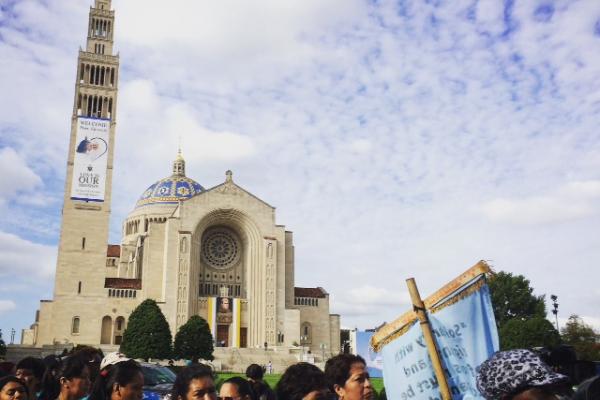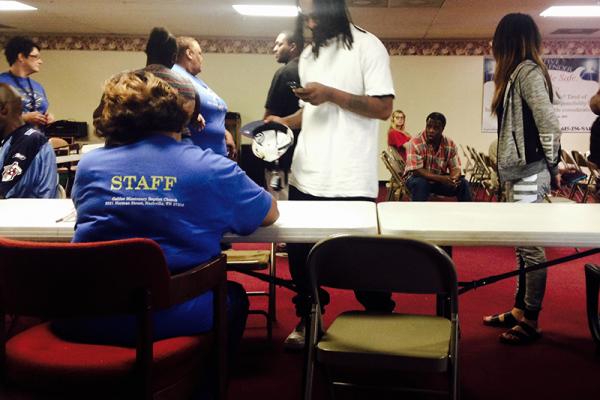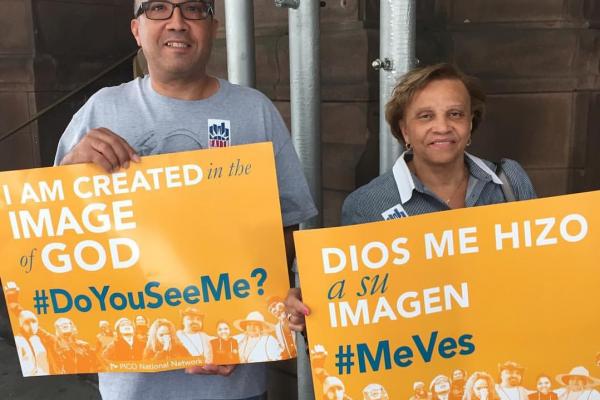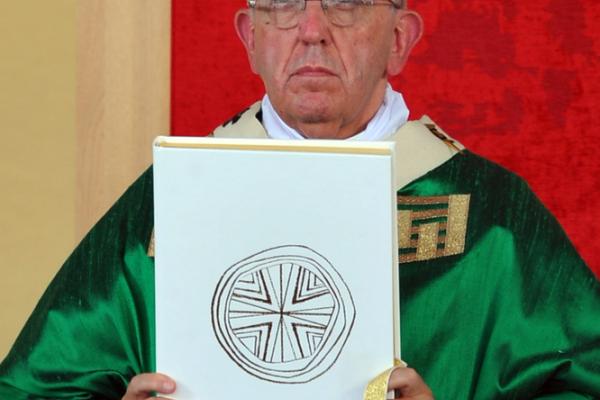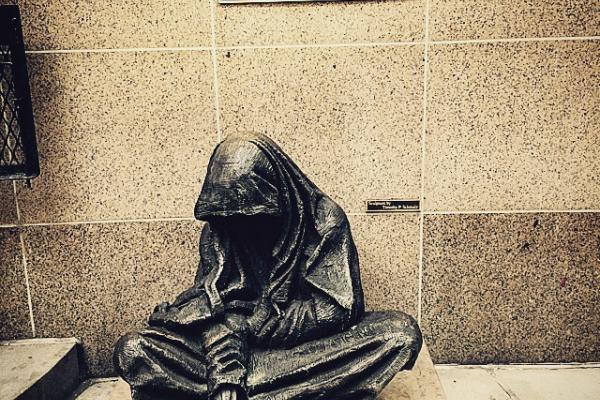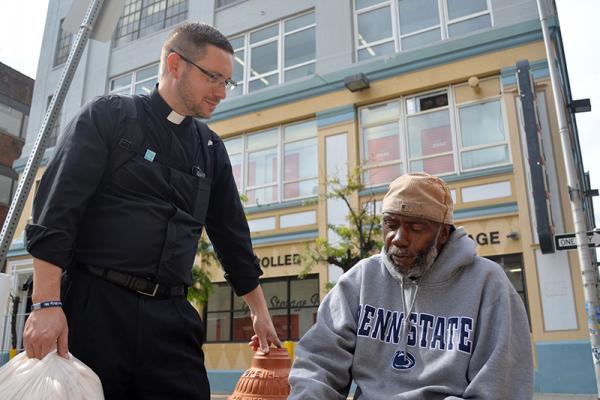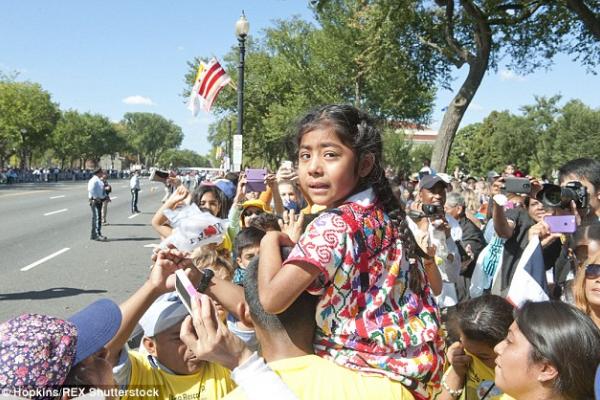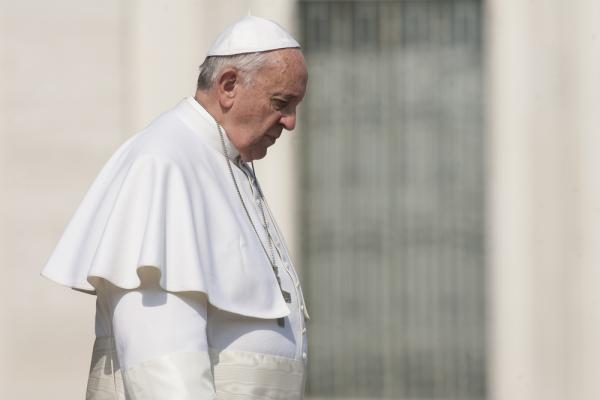To have a group of mostly Hispanic immigrant women at the Basilica, holding aloft quotes about immigration from history’s first South American pope who would deliver a Mass entirely in Spanish the very next day—who would have ever envisioned this scene just a few years ago? It would have seemed absurd or a delusional fantasy at best. Yet here they were. And their stories and their witness are a ray of hope to sustain those fighting to fix our deeply broken immigration system.
The first people that fugitives encountered when they surrendered themselves on a humid September weekend weren’t cops, judges, marshals, or anyone else associated with the criminal justice system.
They were met by a phalanx of smiling, middle-aged church ladies, their vivid blue Galilee Missionary Baptist T-shirts unmistakable under the bright skies, smiling and holding open the door. Two other church volunteers collected belts and keys and sent the visitors through a metal detector.
And then they met Veda Gooch, a Galilee member standing on the other side, quick with a guiding touch on the arm or even a hug if they needed it.
“Y’all here to sign up?” she asked quietly.
Pope Francis touched down at John F. Kennedy International Airport on Sept. 24, but New Yorkers of all faith traditions eagerly awaited his prophetic message of justice for months.
As the Executive Director of Faith in New York, an interfaith community organizing federation of over 70 congregations representing 80,000 families of faith throughout New York City, I believe the pope’s message is an exclamation point to our justice work. Faith in New York is a part of the PICO National Network and as a network we are undergoing A Year of Encounter with Pope Francis, inviting congregations to host small group discussions using our 7-week curriculum focused on immigration, mass incarceration, climate justice, and race and inspired by The Joy of the Gospel, Pope Francis’ first apostolic exhortation. The small groups remind me of the Christian base communities that gave birth to liberation theology in South America. Through these small, interactive groups we hope to remind people of faith throughout America that social justice is not an afterthought to our faith but an integral part of expressing it.
I still recall that moment when I first heard the words of the liturgy:
“The gifts of God for the people of God. Take them in remembrance that Christ died for you, and feed on him in your hearts by faith, with thanksgiving.”
I had never considered the Lord’s Supper as feeding on Christ. Growing up in a charismatic, non-denominational church and then embracing my faith as an adult at a Presbyterian church, I found this to be a foreign (and admittedly strange) concept that didn’t fully take root in me until after I began attending an Anglican church on Capitol Hill.
As I grappled with unemployment those first months in D.C., feeding on Christ in my heart by faith became more real to me: I didn’t have a seat at the proverbial table, but here was a table prepared for me, full of all the goodness and joy and love and peace and grace I could imagine, because it was Christ who was on offer.
Watching hundreds of thousands wait 12 hours for a 12 second glimpse of Pope Francis, listening to jaded journalists drop their professionalism and confess their faith — or desire for it — when covering the Pope, and seeing self-serving politicians become humble and hopeful, I ask, what is this “Francis Effect?”
In the end, it’s not about Pope Francis. He would be the first to say so. A gimmicky CNN invitation asking viewers to tweet three words describing the Pope yielded this from one its reporters: “Not me. You.”
But what causes this response? It is, quite simply, the authentic message of the gospel. The gospel of mercy, the gospel of joy, the gospel of love. Christians believe that Jesus is the compassion of God. The church is formed to embody this reality.
On May 31, 1973, a group of inmates at Philadelphia’s Holmesburg Prison walked into the deputy warden’s office to ask for the establishment of a special prayer room for Muslim prisoners. When Deputy Warden Robert F. Fromhold denied their request, inmates turned on him and Warden Patrick N. Curran, stabbing both men dead with shivs.
On the morning of Sept. 27, the last day of his first trip to the United States, Pope Francis visited a Philadelphia prison named for Curran and Fromhold, where he expressed solidarity with the female and male prisoners.
“I am here as a pastor, but above all as a brother, to share your situation and to make it my own,” he said, and bestowed one-on-one blessings upon a number of inmates — including several who appeared to be Muslim.
President Obama on Sept. 24 announced the names of 18 people who will serve on his third advisory council on faith-based issues.
They include leaders of religious groups and nonprofits — from a former president of a historic black denomination to the head of an anti-hunger group to an executive of a Sikh organization.
Most people here came to see Pope Francis. Patty Disney came to see George Spellman.
Spellman, who said he is in his sixties, is not a world leader or a celebrity. He is a homeless man, living on the streets and battling colon cancer and a broken heart. His 10-year-old daughter was killed, hit by a car, and his life unraveled from there.
But as Francis delighted hundreds of thousands with his appearances at Independence Hall and on Benjamin Franklin Parkway Sept. 27, Disney and a band of 360 volunteers bypassed the crowds and went in search of people like Spellman — down and out and living on the streets.
“We didn’t want to just be present with the Holy Father,” Disney said, preferring a “true spirit of service and a missionary heart.”
And Pope Francis has shaken up Washington politics.
While done in a subtle manner, the pope’s speech to Congress was forthright and unyielding in reminding each lawmaker of the responsibility they have to “defend and preserve the dignity of your fellow citizens in the tireless and demanding pursuit of the common good…”
His bottom line message for the multiple issues he raised and one Congress seems to have strayed away from in recent years was, “Let us remember the Golden Rule: ‘Do unto others as you would have them do unto you’” (Matthew 7:12). Simple, right? Yet Congress seems to be out of touch with the needs of the American people.
People who cover up clerical sexual abuse should be considered guilty, and God will judge priests who are unrepentant about committing such crimes, Pope Francis told journalists at the end of his U.S. tour.
Speaking aboard the papal plane from Philadelphia to Rome, where the pontiff arrived on the morning of Sept. 28, Francis said clerical abuse is “nearly a sacrilege” and the Catholic Church must take a tough line.
“For this reason the Church is strong on this and one must not cover these things up. Those who covered this up are guilty. Even some bishops who covered this up, it is a terrible thing,” the pope said, quoted by Vatican Radio.
